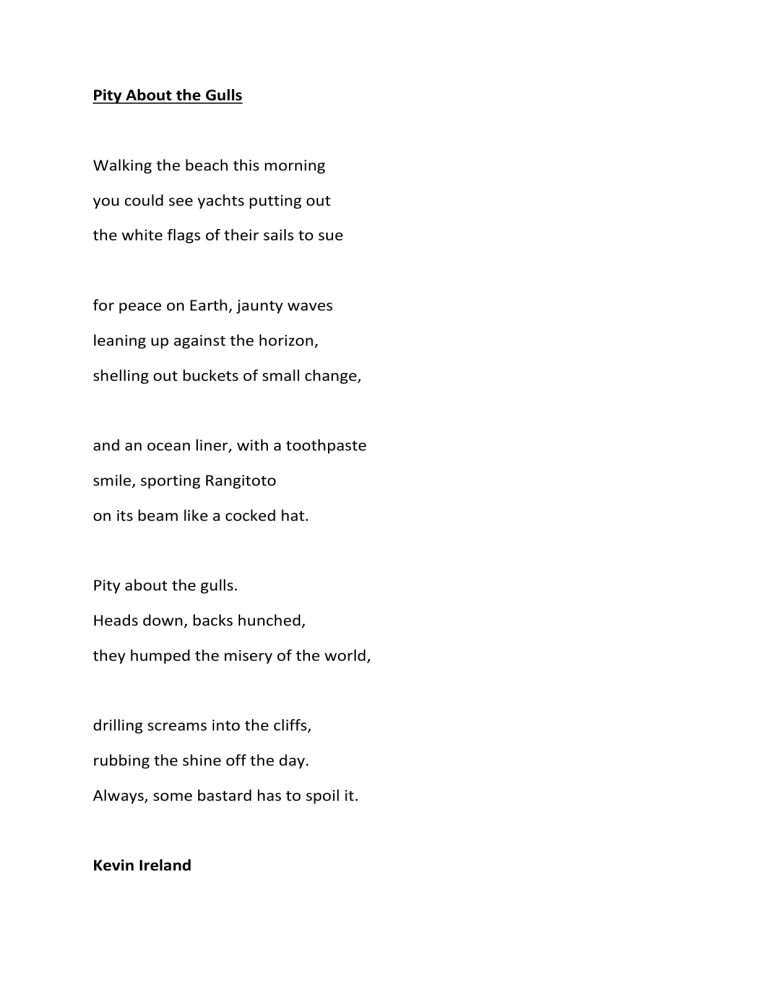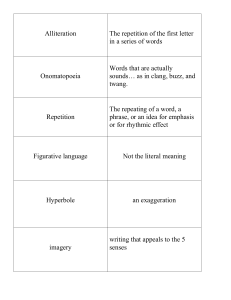
Pity About the Gulls Walking the beach this morning you could see yachts putting out the white flags of their sails to sue for peace on Earth, jaunty waves leaning up against the horizon, shelling out buckets of small change, and an ocean liner, with a toothpaste smile, sporting Rangitoto on its beam like a cocked hat. Pity about the gulls. Heads down, backs hunched, they humped the misery of the world, drilling screams into the cliffs, rubbing the shine off the day. Always, some bastard has to spoil it. Kevin Ireland This poem by Kevin Ireland captures the beauty of a peaceful morning on the beach, with yachts and an ocean liner creating a picturesque scene against the horizon. However, the tone shifts with the line "Pity about the gulls," which introduces a sense of sadness or disappointment. The speaker describes the gulls as hunched and miserable, drilling screams into the cliffs and spoiling the beauty of the day. This juxtaposition between the peaceful scene and the noisy, unhappy gulls highlights the contrast between the natural world and human activity. The poem could be interpreted as a commentary on the impact of human actions on the environment and the ways in which our presence can disrupt the natural order of things. It suggests that even the most idyllic scenes can be marred by the negative effects of our behaviour. Overall, "Pity About the Gulls" is a poignant and thought-provoking poem that invites readers to consider the relationship between humans and nature, and the consequences of our actions on the world around us. Activity 1 Instructions: Match the ten poetic devices on a separate sheet of paper and match each poetic device with the appropriate line. Once students have matched all the lines with the poetic devices, review the answers together as a class. Repetition: The use of repeating words, phrases, or lines to create emphasis or reinforce a certain idea. Personification: Giving human-like qualities or characteristics to non-human things or ideas. Hyperbole: Exaggerated statements or claims not meant to be taken literally. Metaphor: Comparing two things by stating that one is the other, without using "like" or "as." Onomatopoeia: Words that sound like the sounds they describe. Alliteration: The repetition of initial consonant sounds in a group of words. Irony: A situation or statement where the outcome is the opposite of what is expected. Simile: Comparing two things using "like" or "as." 1. Repetition a. "you could see yachts putting out" 2. Personification b. "the white flags of their sails to sue" 3. Personification c. "for peace on Earth, jaunty waves" 4. Hyperbole d. "leaning up against the horizon," 5. Metaphor e. "shelling out buckets of small change," 6. Personification 7. Onomatopoeia f. "and an ocean liner, with a toothpaste smile, sporting Rangitoto" g. "on its beam like a cocked hat." 8. Hyperbole h. "Pity about the gulls." 9. Alliteration i. "they humped the misery of the world," 10.Irony j. "drilling screams into the cliffs," 11.Simile k. "rubbing the shine off the day." 12.Personification l. "Always, some bastard has to spoil it." Activity 2 Instructions: • Think about a time when you were at the beach or any other outdoor location and noticed something beautiful in nature, but then something else spoiled the experience for you. • Write a poem about your experience using the following poetic devices: Repetition Personification Hyperbole Imagery Start your poem with a description of the beautiful aspect of nature you observed, using imagery to create a vivid picture in the reader's mind. Then, use personification and hyperbole to describe how the beauty of nature was interrupted or spoiled by an unexpected or unwanted element. Use repetition throughout the poem to emphasize the contrast between the beauty of nature and the negative element that spoiled the experience. End the poem with a reflection on how the experience made you feel and what you learned from it. Revise your poem, paying close attention to the use of figurative language, imagery, tone and poetic devices. Share your poem with others and discuss how the use of figurative language helped to convey your experience and emotions. Extension: Write a reflection on the poem "Pity About the Gulls". Consider the themes, imagery, and language used in the poem, and how they contribute to the overall tone and message. Additionally, think about your own experiences or observations of nature and the environment. How do they relate to the themes in the poem? Does the poem change the way you view or think about nature? Your reflection can be in any form you prefer, such as an essay, a poem, or a creative writing piece.


